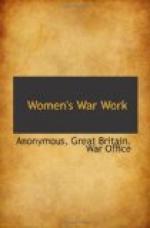The unprecedented state of things produced by the war brought in its train serious anxiety as to moral conditions, not only in regard to the relation between the sexes but in other ways. The gathering of every kind of man together in camps creates great problems. Young boys, who had never been away from home before, who know very little of the world or of temptations, were often flung in with very undesirable companions. There were many risks and many hard tests and the parents who see their young boys go to camp without preparing them, or warning them, do their boys a great disservice and I have known of sons who bore in their hearts a feeling of having been badly treated by their parents, that would never die, for being sent without a word of counsel into these things.
It is not only actions—corrupt thoughts are the most evil of all—and to help to give our boys the greatest possession, moral courage, founded on knowledge, is our finest gift.
There were temptations to think less cleanly, to hear things said without protest and to say them later. There were drinking temptations and one used to wonder with a sick heart, what mothers would feel if they could see these young boys of theirs sometimes, so pathetically young and so foolish. There was also in these great camps of men—let us realize that quite clearly—great good for the boys and the men—good that far outweighs the evil. All the good of discipline, all they gained by their coming together for a great cause, all they gained in that great comradeship and service for each other, and in their self-sacrifice for their country and the world. The wonder and beauty of what it is, and means some of our own men have told us—among them one who died, Donald Hankey, and has left us a rich treasure in his works. And we all know it in our own men—that abiding spirit that is the vision without which the people perish.
But there are and were evils to fight and men and women to help. The huts and canteens and guesthouses are great agencies for good—as well as for comfort. Loneliness, and nowhere to go, and no one to talk to, are conditions that make for mischief.
Then there were the girls at the outbreak of the war, excited by all that was happening, not yet busy as they nearly all are now, feeling that the greatest thing was to know the soldiers and talk and walk with them, and flocking around camps and barracks, being foolish and risking worse.
The National Union of Women Workers decided to take action about this and drew up a scheme which they submitted to the Chief Commissioner of the Metropolitan Police, Sir Edward Henry, K.C.V.O. This scheme was for women of experience and knowledge of girls to patrol in the camps and barrack areas, and talk to girls who were behaving foolishly, and try to influence them for good. It was felt and it turned out to be quite accurate that the mere presence of these women would make girls and men behave better. Sir Edward Henry approved of the idea and arranged that each Patrol should have a card signed by him to be carried while on duty, authorizing the Patrols to seek and get the assistance of the Police, if necessary, and the Patrols wore an armlet with badge and number.




